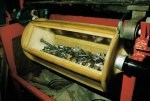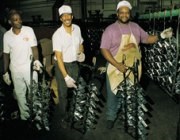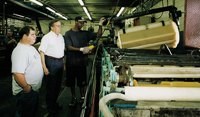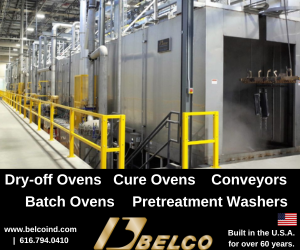Putting a Name on Quality
Signature Works' employees add quality that you cannot see...
Signature Works, headquartered in Hazlehurst, MS, is America's largest employer of the blind. Three hundred and forty of its 600 employees are blind. Although they cannot see the high quality of their work, they know it is there. They also know that you, the consumer, cannot see the added care and pride that make their products even better. However, if absent, both the employees and the consumers would notice.
Quality products manufactured at Signature Works include mops, brooms, facial tissue, paper towels, desk trays, tape dispensers, plastic cutlery, ladders, plastic mailing containers, military whistles and squeegees, among others. Although most of the work is packaging and assembly, there are extrusion lines, press machines and a plating department.
It all started in October 1966, when the National Industries for the Blind purchased the Modglin Co. in Hazlehurst, a traditional for-profit manufacturing company employing no handicapped people. The company was renamed Modglin-Maid and incorporated as a private not-for-profit corporation. In its first year, the company employed 60 workers at the 40,000-sq-ft plant in Hazlehurst and 35 at a plastics facility in Milwaukee, WI. First year sales were less than $2 million.
The following year the company was renamed Royal Maid. It continued to grow, and by 1981 employed 343 people, 184 who were blind. Sales that year exceeded $10 million.
More plants were built. Sales surpassed $16 million. Employment rose until it reached its peak in 1991 during Operation Desert Storm. The company worked around the clock to supply approximately 5.5 million plastic knives, forks and spoons; 600 field jacket liners; and 750 poncho liners daily to the U.S. armed forces. Signature purchased $1.5 million worth of equipment just to keep up with the demand. The equipment included injection-molding machines, flatware molds, conveyor-packing lines, sewing machines and a new truck and trailer. The production increase yielded record annual sales of $46 million.
Defense cutbacks after Desert Storm reduced or canceled contracts for plastic flatware and sewn items. Also, there was a slowdown in the marketplace, making it quite competitive. The company was able to secure a number of projects that saved jobs that may have been lost because of the cutbacks.
In 1996, Royal Maid was renamed Signature Works. It launched two brand names in its cleaning product lines, Miller's Creek and Royalmaid. Products in the cleaning product line are assembled using zinc-plated components. (No blind personnel, however, were and still are not involved with the operation of the plating line.)
Unfortunately, Signature Works was not happy with its plating results: dullness, spotting, poor coverage, white corrosion during warehousing and an average of 50% rejects. Because of this, Signature evaluated different zinc baths for use in its automated-hoist, rack and barrel plating lines. Eighty-five percent of the parts are rack plated, and 15% are barrel plated.
| TABLE II—Operating Conditions for Zinc Plating Operations | ||
| Range | Optimum | |
| pH | 4.8 - 5.5 | 5.0 |
| Temperature | 60 - 120F | 95F |
| Current density | 2 - 80 asf | |
| Anode area | 1:1 minimum anode to cathode | |
| Filtration | 5 - 15 micron cartridge/one tank turnover per hour | |
Signature's goal was improved plating quality and efficiency while reducing waste treatment problems with a non-ammoniated system. Signature implemented a Pavco, Inc. plating process, deleted all chelated products from the original plating processes and switched from ammonium chloride to potassium chloride.
It also decreased anode area in the plating bath 15 to 20% by reducing the number of baskets. Previously, the baskets formed a solid wall that restricted uniform current flow. The parts had no plating thickness in the center, and the outside of the parts had a greater plating buildup. The change provided uniform distribution on all parts.
| TABLE III—Operating Parameters for Blue Bright Chromate | ||
| Parameters | Range | |
| Chromate | ||
| 0.5 - 1.5% | ||
| pH | 1.5 - 1.8 | |
| Temperature | 70 - 90F | |
| Immersion time | 10 - 40 sec | |
| 1. Zinc plate | ||
| 2. Two-station counterflow rinse | ||
| 3. Chromate | ||
| 4. Two-station counterflow rinse | ||
| 5. Dyeing or lacquering | ||
| 6. Hot water rinse 120-160F, omitted if dyed or lacquered. | ||
The new zinc process, AmeriZinc ZCl K3 Futura, is an ammonia-free, acid-zinc plating system that works well in low-current-density areas and bath temperatures exceeding 100F.
After plating, parts are chromated in Pavchrome 95, a concentrated, hexavalent single-dip blue bright chromate that does not require nitric acid in the makeup. The new liquid system (the previous was a powdered system) is completely miscible in water and provides protection from staining and fingerprints. The old system had to be remade every other day compared with the new one, which only requires a changeover every four to six weeks.
With the new system, Signature lowered rejects to less than 5% and increased plating efficiency 25%. It also gave it the ability to replate rejects immediately. Reject parts are run through a hydrochloric acid strip line, reducing storage and handling.
The quality of Signature Works' products proves the capabilities of all workers. From 97% on-time delivery to one of the nation's largest mass merchandisers to its single-source responsibility to the U.S. Department of Defense for selected products, Signature Works is successful in a highly competitive environment.
Integrating people who are blind into a manufacturing environment that includes processes such as plating, which can only be handled by sighted workers, may be considered complicated or dangerous. However, Signature Works focuses on training people who are blind for competitive employment in a variety of work environments that will enrich and empower them. As one worker stated, "It was my sight that disappeared. Not my need to be productive, to compete in the world and provide for my family."
To learn more visit Pavco, Inc.
Read Next
Episode 45: An Interview with Chandler Mancuso, MacDermid Envio Solutions
Chandler Mancuso, technical director with MacDermid Envio discusses updating your wastewater treatment system and implementing materials recycling solutions to increase efficiencies, control costs and reduce environmental impact.
Read MoreDelivering Increased Benefits to Greenhouse Films
Baystar's Borstar technology is helping customers deliver better, more reliable production methods to greenhouse agriculture.
Read MoreA ‘Clean’ Agenda Offers Unique Presentations in Chicago
The 2024 Parts Cleaning Conference, co-located with the International Manufacturing Technology Show, includes presentations by several speakers who are new to the conference and topics that have not been covered in past editions of this event.
Read More


















.jpg;maxWidth=300;quality=90)




